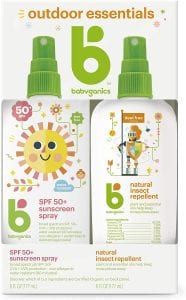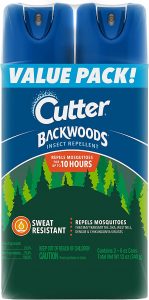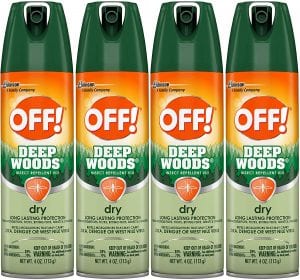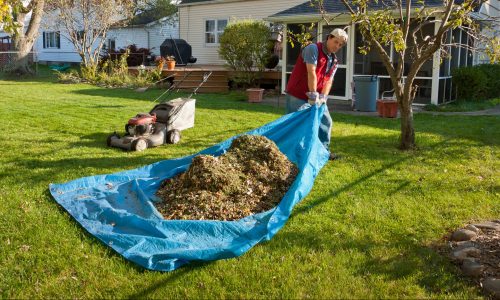The Best Bug Spray
Our Review Process
Don't Waste Your Money is focused on helping you make the best purchasing decision. Our team of experts spends hundreds of hours analyzing, testing, and researching products so you don't have to. Learn more.
Our Picks For The Top Bug Sprays
- 1. OFF! Family Care Smooth & Dry Bug Spray, 2-Pack
- 2. Quantum Plant-Based Family Bug Spray, 4-Ounce
- 3. Bug Soother Lemongrass Essential Oil Bug Spray, 3-Pack
- 4. Babyganics Children’s Zinc Oxide Sunscreen & Bug Spray, 2-Pack
- 5. Repel Outdoor Aerosol Bug Spray, 6.5-Ounce
- 6. Cutter Backwoods Sweat Resistant Bug Spray, 2-Pack
- 7. Sky Organics Unscented Herbal Bug Spray, 4-Ounce
- 8. OFF! Deep Woods Dry-Touch Bug Spray & Mosquito Repellent, 4-Pack
Whether you have a large family or plan a lot of summer get-togethers, this bug spray two-pack is an excellent buy. Each of the spray bottles are easy to use and won't leave you feeling greasy after application. Since they contain DEET, they also protect against ticks, chiggers and fleas.
Stock Up for SummerThis aerosol bug spray allows for a continuous stream, which is perfect for quick protection when spending time in the great outdoors.
When traveling, make sure you pack this bug spray in your backpack. It's free of DEET and made with essential oils that are known for repelling insects, like mosquitoes and ticks. Since the formula is free of harsh chemicals, it's also a safer option for children.
Budget-Friendly OptionThis bug spray is affordably priced, especially for a plant-based option.
If gnats, black flies and no-see-ums are your issue, this mild natural pest repellent might suffice. The ingredients list is packed with items that not only repel insects but feel good on the skin, including purified water, glycerin and vitamin E. The scent comes from lemongrass and vanilla.
Great for Smaller InsectsAlthough this bug spray works against some mosquitoes, it's best for repelling smaller pests like gnats.
The aerosol format of this bug spray makes application easy. it includes both 40% DEET (one of the highest concentrations available) and Picaridin, a combination that helps provide reliable, odorless, clean-feeling protection against bugs for long stretches of time.
Easy ApplicationApplying this highly-effective 40% DEET sunscreen is a breeze thanks to the aerosol format.
Buying Guide
Few things can disrupt a great time outdoors like bugs. Gnats and no-see-ums are annoying, to be sure, but mosquitoes are the worst since they actually leave bites on your skin. Plus, mosquitoes can carry disease, putting you and your loved ones at risk.
That’s where a good bug spray can come in. There are plenty of products on the market that claim to keep bugs at bay but finding one that works well while you’re outside for hours, sweating and movie around, is a challenge. Even more difficult? Finding a bug spray that is effective and also well-tolerated by your family members.
One of the top ingredients in bug spray is DEET, which has been around since the 1940s. DEET, a man-made chemical also known as N,N-Diethyl-meta-toluamide, is widely considered to be the most effective ingredient in repelling the most invasive types of mosquitoes, as well as other bugs.
Some households avoid bug sprays with DEET altogether, although most high-quality recent research has shown it to be relatively safe even for babies 2 months old and up. In recent years, products have emerged that use natural ingredients, including essential oils, that bugs may find distasteful. These might not be as long-lasting or effective as DEET, but many consumers and even experts have found that they do quite well at keeping bugs at bay, especially if you apply them thoroughly and often.
What to Look For
- Applying bug spray can be an involved process if you’re using a product with a pump spray mechanism. Aerosols allow you to get the product on the skin liberally, without missing chunks of skin or taking a long time. But there are concerns about aerosols and the environment, so if that’s a worry for you, one that uses a pump might be better.
- As effective as chemical-based bug sprays can be, the odor can be unpleasant. Sprays that use more natural ingredients are typically much easier on the nose. But they may not work as well, so you’re making a tradeoff.
- Whether you’re applying bug spray to another person or yourself, be very careful around the eyes, mouth and nose. To better control the application, it’s usually best to spray it on your fingers, then spread it on the skin.
- Some bug sprays designed for young people build in sunscreen. This can be a great way to make sure your children have full protection from outdoor dangers without having to layer two products on top of each other.
- If you’ll be spending more than a couple of hours outdoors, a bug spray with DEET is likely the best option unless you plan to stop and reapply every couple of hours. DEET can last for hours and also resists losing effectiveness if you sweat.
More to Explore
Mosquitoes are relatively small in comparison to dangerous animals like sharks and alligators. But did you know the tiny insects actually kill more people each year than any other creature? Mosquitoes carry deadly diseases like malaria and the Zika virus, leading to an estimated one million deaths each year.
There’s a biological reason mosquitoes bite humans: reproduction. The females drink human blood for sustenance, but the blood also provides them with protein to help in egg formation. Mosquitoes can lay up to 100 eggs at a time, so they need plenty of protein! However, the bites that result can be at the very least a nuisance to humans, who must then deal with itchiness at the injection spot. And sometimes, more serious complications follow.













